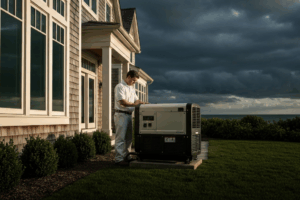
Starting an Electrical Contractor Business in Washington: Your 2026 Guide
For any experienced journeyman or master electrician, the dream of being your own boss is powerful. You’ve put in the years, mastered the trade, and now you’re ready to build something of your own. In Washington, a thriving economy and growing population make the prospect of launching an electrical contractor business more appealing than ever. But turning that dream into a reality requires more than just skill with the tools—it demands a solid understanding of the state’s specific licensing and business requirements.
Navigating the path to becoming a licensed electrical contractor Washington business owners must follow involves a dual-track process managed by the Washington State Department of Labor & Industries (L&I). You don’t just get one license; you establish a licensed business entity and then assign a highly qualified individual to be legally responsible for the compliance of all electrical work. This guide will walk you through the essential steps, from setting up your company to understanding the critical roles of administrators and master electricians.
The Two-Part Structure of a Washington Electrical Contractor License
Unlike some states where a master electrician license automatically allows you to run a business, Washington separates the business license from the individual’s technical qualification. To operate legally, you must satisfy both components.
- The Electrical Contractor License: This is the license for your business entity itself.
- The Designated Master Electrician or Electrical Administrator: This is the certified individual responsible for ensuring all work performed by the company meets state laws and codes.
Think of it this way: the contractor license puts your company on the field, but the designated master or administrator is the head coach responsible for every play. Let’s break down how to get each component in place.
Step 1: Building Your Business Foundation
Before you can even apply for an electrical contractor license, you need to establish a legitimate business in the state. This process involves a few key legal and financial steps.
Register Your Business and Get a UBI Number
First, you must decide on a business structure. Many contractors choose a limited liability company (LLC) to protect their personal assets from business debts and lawsuits. Once you’ve registered your business name and structure with the Washington Secretary of State, you will apply for a business license with the Department of Revenue. This process will generate your Unified Business Identifier (UBI) number, a nine-digit number that is essential for all business activities in the state, including applying for your contractor license with L&I.
Secure Your $4,000 Surety Bond
Washington requires all electrical contractors to file a $4,000 surety bond (or an equivalent assignment of savings) with L&I. This bond is not insurance for you; it’s a financial guarantee for your customers and employees. According to the Revised Code of Washington (RCW) 19.28, this bond protects consumers from damages resulting from work that violates state codes and ensures employees are paid the wages they are due. The cost of the bond is a small percentage of the total amount and is based on your credit history.
Arrange for Insurance
While L&I does not mandate general liability insurance for the electrical contractor license itself, it is a non-negotiable part of doing business. Most clients, especially for commercial projects, will require proof of significant business liability insurance before you can even bid on a job. Furthermore, if you plan to hire employees (including apprentice electricians), you are required by law to have workers’ compensation insurance.
Step 2: Assigning Your Responsible Individual
With your business structure, UBI, and bond in place, you now need to designate a qualified person to oversee all electrical work. This is a critical step for your Washington electrical contractor license. You have two options: an Electrical Administrator or a Master Electrician.
- Electrical Administrator License: An administrator is a person who has passed the state’s rigorous PSI electrical exam to prove their knowledge of codes and regulations. Their sole function in this role is to ensure the contractor’s work is compliant with the Washington Administrative Code (WAC) and other electrical laws. An administrator cannot perform hands-on electrical work unless they also hold a separate journeyman electrician or trainee certificate.
- Master Electrician Washington: A master electrician is a seasoned professional who has worked as a journeyman for at least four years and has passed the master electrician exam. This certification allows them to both perform hands-on electrical installations and serve as the designated administrator for an electrical contractor.
For many new business owners, the founder is often the one who holds the master electrician or administrator certification. If you’ve been working as a residential electrician or in the commercial sector, leveraging your experience to pass one of these exams is your direct path to launching your own company.
Navigating the Path to Certification and Compliance
The journey to becoming a business owner starts long before you fill out the first application. It begins on the first day of your apprenticeship. The state has clear pathways, from fulfilling apprentice electrician requirements to earning your journeyman license, which is the foundation for higher certifications.
This journey demands a commitment to continuous learning. The electrical field is never static; codes evolve, technology advances, and safety standards are updated. Staying current with the National Electrical Code (NEC) is not just good practice—it’s a requirement for license renewal in Washington. Staying up to date on topics like dwelling unit load calculations and service equipment labeling is essential for day-to-day compliance.
Meeting Continuing Education Requirements
To maintain their certification, every journeyman, master electrician, and administrator in Washington must complete 24 hours of electrical continuing education every three years. According to the L&I, these hours must be structured as follows:
- 8 hours on NEC Code Updates
- 4 hours on RCW/WAC Updates
- 12 hours of other approved industry-related topics
For a busy contractor, finding time for classroom courses can be challenging. Fortunately, many electricians are turning to state-approved online electrical courses to meet these requirements efficiently. This ensures you’re compliant with the latest rules, such as knowing how many service disconnecting means are allowed, without disrupting your work schedule. Fulfilling your CE is a cornerstone of maintaining the trust and authority that comes with your license.
Growing Your Electrical Business
Once your business is licensed and operational, the next phase is growth. You might start out focusing on your area of expertise, such as being the go-to residential electrician in your community. Or, you may leverage your background to pursue larger commercial and industrial contracts. Whatever your path, success depends on a reputation for safety, quality, and deep code knowledge.
By understanding the distinct roles of the contractor, administrator, and field electrician, you can build a compliant and scalable business. The frameworks of RCW 19.28 and WAC 296-46B aren’t just bureaucratic hurdles; they are blueprints for a professional, safe, and successful electrical contracting industry. Embrace them, stay educated, and you’ll be well on your way to building a lasting enterprise in the Evergreen State.
Ready to get started on your continuing education? ExpertCE offers L&I-approved online courses to help you meet your renewal requirements and stay ahead of the curve. Browse our courses today to find the Washington-specific training you need.
Disclaimer: The information provided in this educational content has been prepared with care to reflect current regulatory requirements for continuing education. However, licensing rules and regulations can vary by state and are subject to change. While we strive for accuracy, ExpertCE cannot guarantee that all details are complete or up to date at the time of reading. For the most current and authoritative information, always refer directly to your state’s official licensing board or regulatory agency.
NEC®, NFPA 70E®, NFPA 70®, and National Electrical Code® are registered trademarks of the National Fire Protection Association® (NFPA®)



